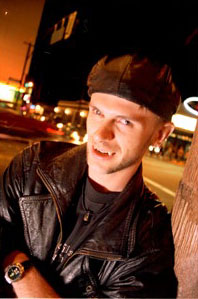
Fee, Fie, Faux Fangs:
Satak Mwadeib bares his character on the streets of downtown San Jose.
Photo by Christopher Gardner
Vampire gamers play out Gothic fantasies on the urban landscape, unbeknownst to the mortals among them.
By Richard Sine
TIMOTHY STORK LOVED the night shift. He would lumber into work at about ten, shirt untucked, plaid tie loose, his flabby cheeks pale under the flourescent lights. The newsroom, so frenzied during the day, was silent but for the tinny voices emanating from the police scanner by Timothy's desk, the rasp of the newswire printer spilling rivers of copy onto the floor, and occasionally by Sarah, the night editor, humming one of her show tunes.
Timothy wouldn't stay in the office for long if he could help it. The newsroom's blank fluorescents felt a little obscene, a little unnatural; if he closed his eyes he could feel their sting on his eyelids. On good nights, the scanner would blurt news of a homicide or a four-alarm fire, and he would haul off to the scene with the epic stride of the obese.
Other reporters despised the lobster shift, suffering through this brief purgatory on their way to better assignments. But Stork never left. With his cellular phone and his laptop, he could work the streets until sunrise. Eventually he got to know the punks and the pushers as well as the cops.
Then he got to know a little too much.
He started noticing that many of the bodies he saw turned so pale only moments after death. One night, he saw a street kid shrivelled and sheet-white, obviously drained of blood. Timothy started asking hard questions of the coroner, who refused to confirm what Timothy knew he had seen.
The coroner didn't have much patience for snoopy mortals like Timothy. He knew what had to be done and personally took care of matters with Timothy the following night.
Afterward, Timothy's life didn't change as much as the average mortal might think: He kept his job and his apartment. His eccentric reputation deepened, however. Invited to day editorial meetings or lunches with editors, Timothy simply wouldn't show, mumbling an excuse on voicemail.
He kept finding strangely pale bodies at the scenes of his crime, but saw little reason to worry about them anymore--unless one of his fellow Kindred got a little reckless. Then he would threaten to blow the whole masquerade, promising lurid stories all over his newspapers, complete with pictures. Nobody could tell if he was bluffing.
While many of the Kindred made a scene over the tragedy of their situation, the Faustian exchange of immortality for murder and all that, Timothy never talked about it with anyone. He hated their dramatics as much as he hated the Hunger. Instead, he let the horror chip away at him slowly.
His deepest regret, more than the pain and occasionally mortal injury he caused his victims, was Sarah. Timothy had hoped that someday the little waif would see through his flab and sullenness. He used to feel his heart pound whenever she was near.
Now, he knew he would never feel his heart pound again. Instead, whenever she approached, he would be overwhelmed by that smell ... the blood ...
![[line]](/gifs/line.gif)
Where to find vampire games in the South Bay.
Santa Cruz and Sonoma County are also
home to vampires.
![[line]](/gifs/line.gif)
THE RULEBOOK TO Vampire: The Masquerade was given to me by Trystan Bass, a young woman who leads a live-action game on the streets of downtown San Jose. Trystan is baby-faced and a little pale--a good meal--and on sunny days walks the town underneath a Chinese parasol. She calls herself a "perky Goth" on her Toreadors Web page, one of the most highly respected Goth sites in a culture that is infatuated with the Web. She is also the "Storyteller" of her game, The Seven Deadly Sins, which started last month. It is one of maybe a dozen such live-action vampire games that are occurring at any one time throughout the South Bay, one of hundreds of games across the country.
Since its release five years ago, the rulebook to Vampire: The Masquerade has sold nearly 300,000 copies, making it the second most popular role-playing game behind the granddaddy of them all, Dungeons and Dragons. Vampire inherits much of its game structure from D&D--each player gives his character "points" for characteristics such as Strength and Intelligence--except the Gothic-Punk setting of Vampire has more in common with the dim urban hell of movies like The Crow and Batman Forever than the enchanted forests of Dungeons and Dragons.
What does it mean to say that Vampire is a Gothic game? Mark Edmundson of the University of Virginia writes in Civilization magazine that America is in a fin de siecle fixation with the Gothic. He claims that the media coverage of O. J. Simpson held a lot in common with classic Gothic works such as Dr. Jekyll and Mr. Hyde. "Simpson was habitually cast by the media as an archetypal Gothic hero-villain," he writes. "He is, we were told, a man with a divided nature, possessed, in Gothic fashion, by a demon within."
The media speculated whether Simpson was addicted to cocaine. But the modern fascination with addiction, Edmundson says, "is just our contemporary word for haunting, the Gothic state proper, just as obsession was one of Freud's; to be addicted is to be possessed by some raging appetite that reason can't quell."
The introduction of the Vampire rulebook, perhaps inspired by Anne Rice, encourages us to bring to life the tragedy at the core of Gothic drama. "In Vampire, characters are almost certainly doomed from the moment they are Embraced [i.e., made into vampires]. Though they are powerful beyond imagination, they are also cursed. No matter what they do, they remain monsters, with a horrible, unquenchable thirst. The stores in Vampire are unique because they all have this element of tragedy."
Every character in the Vampire game is supposedly struggling to control the beast within, but it is "difficult to do anything to slow your character's inexorable slide into madness. The whole idea is to hang on as long as possible and eke out the most drama from the ongoing tragedy."
To try to make this struggle concrete, each character is given up to ten "Humanity points" which they will lose as the centuries progress or they commit ever more heinous acts to satisfy their bloodlust. Once your Humanity points are gone, you're out of the game.
I formulated the Timothy Stork character with the rulebook's exhortations foremost in my mind. Far from the sleek seducer of Count Dracula fame, I had in mind a reluctant vampire: a fat, dishevelled schlump who grabbed his victims and sank his fangs with about as much as enthusiasm as he washed his dishes. A man who suffered a silent yearning for the days when he could survive without having to kill.
Before putting Timothy Stork into action, however, I wanted to learn the ropes. So I sat in on a game that takes place weekly at A Place to Play, a San Jose game shop.
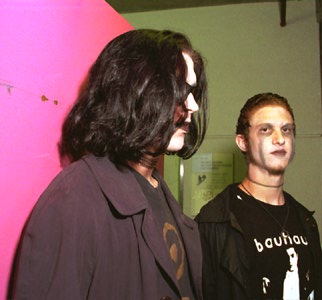
Christopher Gardner
Two From the Vaults: Gabriel and Asmodean try to avoid the public eye.
A YOUNG BUCK bursts impertinently into the little room upstairs just as two particularly powerful vampires are having a meeting. He wants to listen in. "I'm a cockroach," the kid says to the Toreador. "I came in on your back."
The Toreador, a portly, stringy-haired fellow whose "character" obssessively sniffs a red rose, narrows his eyes. "I have an Auspex of 3," he replies. "I sense you on my back and swat you down. Now, I can crunch you, or you can scurry away."
The kid gives a sheepish look and closes the door again. The vampires resume a debate over who will become the new Prince of the City.
The night had begun in the shop's darkened main showroom with a verbal presentation of that day's game newspaper. A man had been found dead in downtown San Jose, complete with fangmarks on the neck and a note reading "Vampire." A piano at the Toons bar, also downtown, mysteriously started playing by itself. Lightning struck at the Happy Hollow Park and Zoo on Senter Road, killing some animals. In another story, the San Jose Police Department is demanding a raise and threatening to strike.
Early in the evening a woman named Liz calls a meeting of the "Primogen," or top vampires in the city, in the room upstairs. Most of the Vampires in the Vampire game are members of one of seven clans, each of which conforms to a different stereotype from film or literature. There's the hideous, subterranean Nosferatu of silent-film fame; the foppish and beautiful Toreador reminiscent of Anne Rice's Vampire Lestat; the feral punk Brujah depicted in The Lost Boys; the calculating, aristocratic Ventrue modeled after Bram Stoker's original Count Dracula; and a few others. Most players fashion their characters after one of the clans.
Each city has a Primogen, or leader, for each clan. Usually the clans live in an uneasy truce under the reigning Prince of the City. As much as they may dislike each other, they all have a common interest in maintaining the Masquerade: the illusion that there's no such thing as vampires. They know that there are never enough of them that mortals working in a concerted effort couldn't hunt them down and kill off most of them, as they did during the Inquisition.
Liz is a friendly young lady who affects a dismissive manner and a strange European accent when she is in character. She is the Brujah Primogen. At the meeting she declares that she, not current prince Dan, would be best qualified to dispatch "the chaos that is engulfing the city."
Various vampire factions quickly take sides. Later in the meeting a leather-jacketed member of the tough-guy Anarch contingent struts in to inform Dan menacingly, "We want her in charge." A platinum-haired high-school kid, who had walked into the room announcing he had taken the form of a bird perched on the windowsill, morphs into human form to proclaim, "My people won't be happy if she takes charge." The meeting breaks up after the Primogen decide to meet later for a vote.
Most of the night pretty much went like this, with small groups of two or three people discussing "alliances" with a caginess that would make Otto von Bismarck feel like Pippi Longstocking. Occasionally they would break into "battle," which they would half-talk, half play out--miming a parry or pounce, then fishing out their character sheets to see who had more points in Strength or Stealth or various supernatural powers.
I have to admit that by a couple hours into the game, I really didn't care who was going to end up Prince at the end of the night. I wouldn't have wanted any of these characters over for dinner, much less made Prince of my city. No one seemed enmeshed in any kind of inner turmoil over having to suck people's blood to survive. Most everyone was suspicious, curt, manipulative and belligerent.
In short, they acted like characters in some awful Aaron Spelling soap opera. It's not too surprising, then, that the Spelling people picked up on the Vampire game. In Kindred: The Embraced, a short-lived Fox series from last year, the clans fight to control a stage set dressed as San Francisco.
Kindred is like its more popular Spelling kindred, Melrose Place, except that instead of everyone sleeping with each other, everyone kills each other, or at least plots to do so. The women are bitchy and the men are suave, and in both shows the scriptwriters carefully avoid making any one character too sympathetic or too conflicted--it would only close off avenues for the endless scheming. These shows are not just bad, they're bad-natured.
Gamers might argue that I'm taking this all too seriously, that it's just a game after all. But Vampire intentionally creates its own poisoned atmosphere. Chess is a scheming game too, but no one asks you to play the bishop.
The next week, as I drive over to Trystan's game, I decide to make my character, Timothy Stork, a mortal rather than a vampire. I'm not quite ready to join the bloodsuckers' club yet.
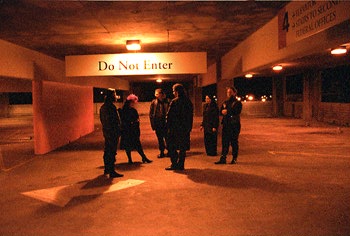
Christopher Gardner
Vampires Only: The "Seven Deadly Sins" clan gathers in a parking garage-cum-skyscraper each weekend to plot its imaginary takeover of the city.
TRYSTAN'S GAME MEETS at the parking garage above the Camera Three Theaters at Second and San Carlos streets. In the game's feverish imagination, the garage is a steel-and-glass skyscraper, the "Second Street Plaza," with a posh penthouse club that admits vampires only.
There are a couple of hardcore Goths here, complete with leather lace-ups, white face makeup and tin lunchboxes. Many of the rest are pudgy guys in black jeans with stringy hair and scraggly beards. Though many of them play lithe, seductive vampires in the game, most of them look more like my character, Timothy Stork. There's also a smattering of women here. Vampire is virtually the only role-playing game women play in any significant numbers.
Most live-action storytellers have formulated vampire histories of their cities. The rather amusing and unsettling idea is that if you can dig your way deep enough into any organization, you'll find a pair of fangs. After all, no organization is safe from someone with infinite patience and otherworldly powers.
Trystan's history is considerably more elaborate than most. A thick booklet explains how the punk-intellectual Brujah clan steers San Jose State University, how the artsy Toreadors engineered the downtown renaissance by pulling strings at the Redevelopment Agency, how Ventrue money powered Silicon Valley startups. Her booklet specifies exactly which clan controls each of the clubs, restaurants and museums downtown. The gist is clear: Mortals may think they're in control, but they haven't a clue.
Trystan, clad in a black serving-wench dress, is handing out the game's newspaper, the Silicon Valley Monitor. The Monitor exaggerates the spookier aspects of the downtown landscape, such as the long-abandoned Victorian at one edge of the San Jose State campus (which in the game is haunted by a man who plays a wraith). Other events in the paper are total fabrications, such as the mysterious disappearance of a mental patient accompanied, some neighbors said, by "reports of loud screaming sounds."
I announce to Trystan that I'm a mortal, which pretty much relegates me to one corner of the garage as Trystan introduces some of the characters to each other. In the game, I'm not even supposed to be sure that vampires exist. Like a jury pick in the O.J. Simpson case, I know much more information than I'm supposed to use.
As a police beat reporter, Trystan informs me that pretty much the only people I can talk to are mortal cops, FBI agents and such. Then she tells me the cop is Mike Puccini, who's also the storyteller for the game at A Place to Play.
Mike is an obese, bespectacled man who seems to know everything. I want to run up to him and say, "You're a mortal, too? Let's go vanquish some vampires!" But first I find his friend Tony Lewis, a house music DJ who plays Puccini's brother in the game. Tony leads me across the lot to Mike. I walk to within maybe three feet from Mike, but Mike is not acknowledging my existence. He is reading something.
"Call him on the phone," Tony tells me.
"Ring, ring," I say, awkwardly.
Mike impatiently puts one hand to the side of his head, sticks out his thumb and pinky. "Homicide, Godfrey here."
"Yes, this is Timothy Stork with Metro. I'm, uh, I'm working off a tip ..."
I trail off. Mike sits there with his hand to his ear, staring 45 degrees to my right, already annoyed by the pause. I realize with a sinking feeling that these people take this game very seriously.
"Well, I'd been noticing that some top city officials, like Frank Taylor at the Redevelopment Agency, are only taking meetings at night lately. So then I got this funny call the other day from some guy--well, you're not going to believe this--some guy who claimed that vampires were running the city."
Mike laughs out loud. "That's ridiculous. I assure you there's no such thing as vampires."
As I choke on a response, a few more players approach Mike and he cuts me off. "If you'd like, we can meet in 20 minutes at the Camera Café. We can speak in private there." And he hangs up.
Twenty minutes later at the café, I am still getting nowhere with Mike. But then we are interrupted by a guy in a brown suede cape, tuxedo shirt and cane. "Dmitri," as his character is known, is followed by an FBI agent in a gray suit and another man wearing a pin that reads: "You can't see me, I'm invisible."
Dmitri puts two fingers under his eye to signify heightened senses. "Do I hear heartbeats?" he asks. He hears two. I introduce myself merely as a friend of Mike's. Mike looks at Dmitri pleadingly. "I'm an orphan," he says. "I request entrance into the city."
I have no idea what this means.
Soon Dmitri uses his Dominate power to push me out of the conversation. I find Trystan again, who informs me that the director of the mental hospital is meeting her at the Kismet Cafe. Maybe by "covering" that story, I'll learn something about the vampires.
I walk down South First to get to Kismet, past all the nightclubs. It's a frenetic night; the sidewalk is packed with party girls, punks, frat boys and posers. I really don't know whether the vampire players are more creative than these people, or simply more delusional. I don't know if we are spending our time more constructively than they are. I don't know whether the scheming in the game is any less deplorable than the scheming on the street.
As something of a geek myself, I have long wondered what the beautiful people talk about as they are huddled in their little clusters on the sidewalks or in the clubs. It is not too hard for outsiders to imagine that there are plots hatched in these little circles to keep the rest of us out. I wonder if the Vampire game, with its conspiracies and political ploys, is a sort of fun-house mirror the geek world holds up to the straight. Maybe the geeks, who dropped out or never quite got it, imagine that this is how the beautiful people conspire to run the world.
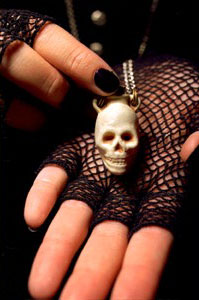
Head Trip: The stories created by die-hard Vampire gamers are supposed to embody the tragedy of the Gothic drama. Costumes and props are just for fun.
Photo by Christopher Gardner
AT KISMET, TRYSTAN doesn't seem to recognize me. She's playing her gossipy, Ab-Fab character, Ondine Mei-Thai. She puts me in a bewitching trance which largely prevents me from learning anything from the man playing the mental hospital director. I wander back to the parking garage to discover Mike. I realize I have to find some way to force his hand.
"This is Timothy Stork from the Metro. My editor has assigned me to do a story about orphans, and I remembered that you told Dmitri you were an orphan. Would you mind sitting for an interview?"
Mike and I walk down San Carlos Street discussing his homicide cop's orphan upbringing. (One day he found his mother stabbed to death, and his father disappeared out of an open window.) As we talk, a man in black jeans and a fedora crouches against the wall, smoking a cigarette. He is staring at us. As we pass him, I notice he has a horrible scar on his cheek. He scares me. Mike tells me later that he is a character in the game, a Nosferatu Primogen. The scar is makeup.
A couple of other Vampire-playing groups are passing by us, indistinguishable from most other young people on the street. As they pass each other they throw out hand signals to each other like East Side O.G.'s. The signals symbolize their special powers, indicating whether they can listen in on each other or offer help in each others' schemes.
Meanwhile, of course, art-house goers are hurrying to the next showing at Camera Three or sitting at the café downing Italian sodas, utterly oblivious to the fact that mock struggles for the soul of the city, even life-and-death battles, are occurring in their midst.
My conversation with Mike is interesting, but doesn't help me get any closer to the vampires. Finally, during a break at the McDonald's across the street, Mike and Tony decide to cut me some slack. "Look into a guy named Alejandro Peña," Tony tells me, in character. "He's Prince of the City."
"What does that mean? Is he a vampire?"
Tony ignores the question. "He owns that building on Second and San Carlos. Tell me everything you learn, and maybe I'll tell you some more. And one last thing."
"Yeah?"
"There's no such thing as vampires, right?"
"Right."
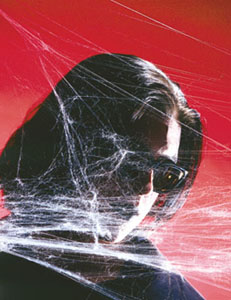
Caught in the Web:
Vampire players spin intricate tales of deceit and undead passions.
Photo by Christopher Gardner
OF COURSE, I'VE seen "Alejandro" hanging around, but I know I can't just walk up to him and start asking questions. I "call" Peña's secretary, who tells me:
"Mr. Peña is heavily booked. I don't know if he'll have time for an interview--"
"Just take a message, will you? Tell him I'm doing a story on local royalty."
"Royalty? I don't know why you would want to speak with Mr. Peña about that--"
"And tell him that I'd be perfectly happy to meet him at any time of night."
That apparently gets attention, and the secretary goes off in search of the man who plays Peña. I get a bit of a glow out of this. I had played myself--though, admittedly, my most calculating side--and done a good job.
But after a few minutes, I tell Thomas to call off the search. It was getting late in the evening. And I didn't know exactly what I wanted to say to Peña. If Timothy Stork had confronted Peña this early in the game, Peña might have simply overpowered him and dragged him into the underworld. I don't think Timothy would have wanted that. Or deserved it. Where would that have left him with Sarah, and her show tunes?
[ Metro | Metroactive Central | Archives ]
![[Metroactive Features]](/features/gifs/feat468.gif)